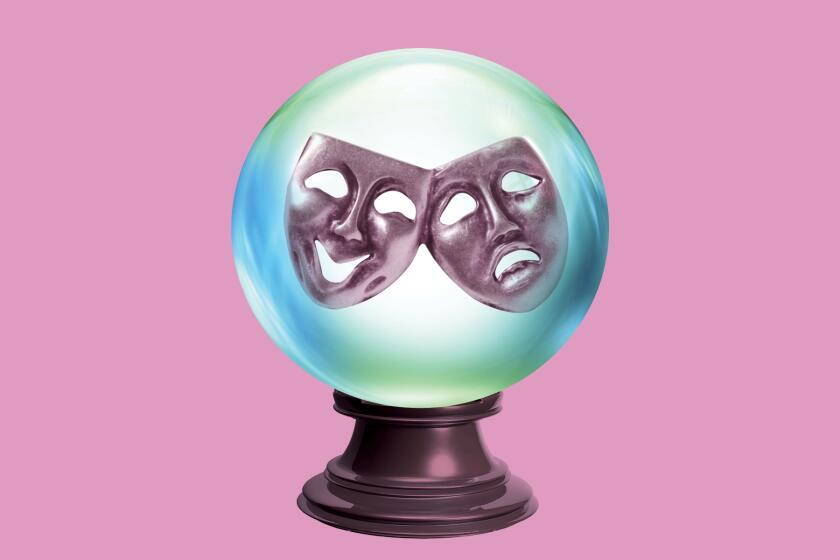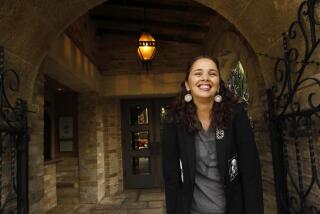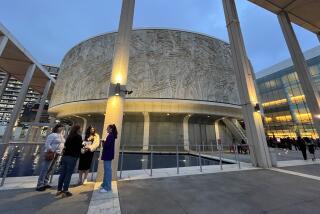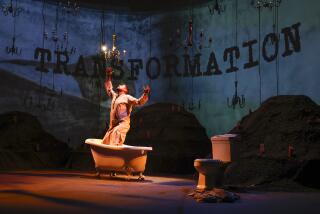How the Kirk Douglas Theatre transformed into a digital studio for streaming
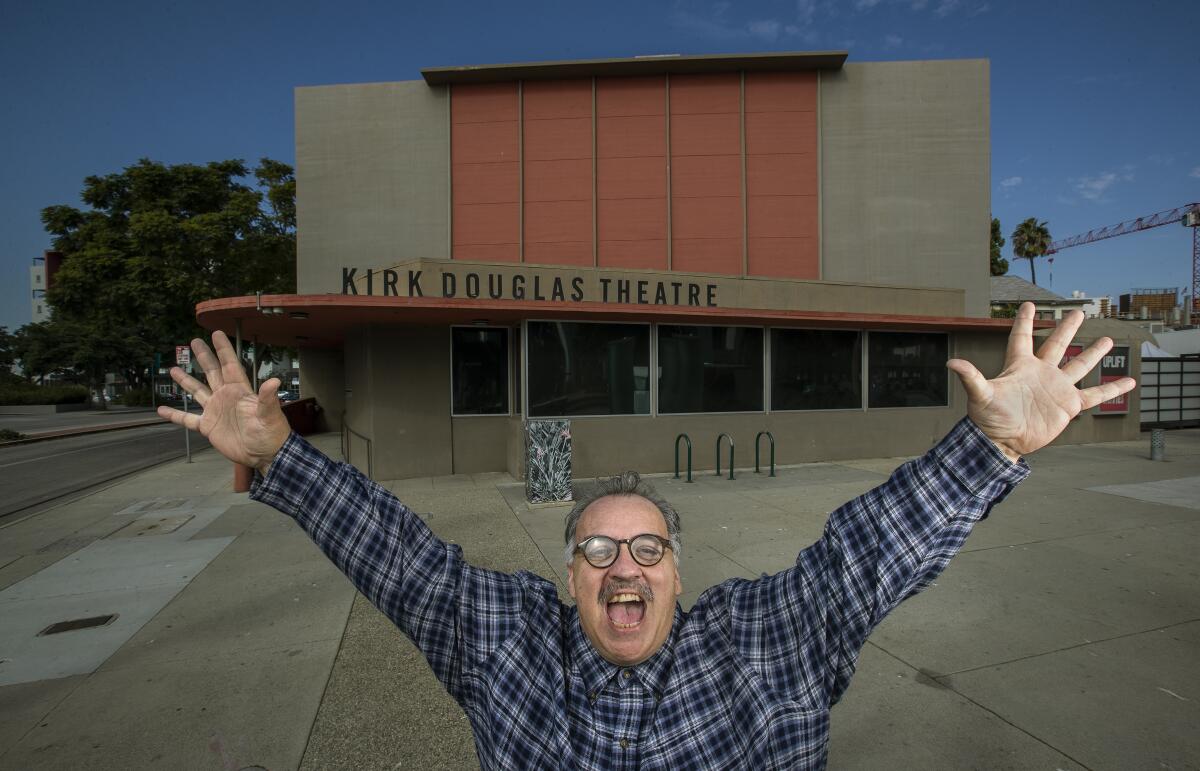
Playwright Luis Alfaro has been tested for COVID-19 seven times in the last two months. He jokes that he’s gotten very used to things going up his nose.
But the precautions couldn’t be more serious as Center Theatre Group and the Getty Museum prepare to co-present “The Greek Trilogy of Luis Alfaro,” the MacArthur fellow’s Chicanx adaptations of ancient plays. A staged reading of “Oedipus El Rey” starts streaming Friday through CTG’s newly launched digital stage, with Alfaro’s “Mojada” to follow on Nov. 20 and his “Electricidad” on Nov. 22.
The plays’ journey from stage to screen — and the transformation of CTG’s Kirk Douglas Theatre into a filming studio — is gripping drama unto itself, a tale of overcoming adversity and finding meaning and connection in the darkest hours.
“Everybody was so hungry for the stage,” said Juliette Carrillo, who directed “Mojada.” “We were so excited to be in the same room.”
Patti LuPone, Lynn Nottage, Tarell Alvin McCraney, Young Jean Lee, Joe Mantello and others answer the question: How should theater be different?
The team’s physical togetherness was relatively short — just eight hours per play — but the preparation for that creative catharsis was months in the making. From March, when CTG shuttered operations in the face of the pandemic, until now, the company has been striding toward creating a safe place to resume work, facilities manager Max Oken said.
The ultimate goal, of course, is to unite performers and audiences under the same roof. But with that reunion still elusive, CTG, like numerous arts organizations across the country, is pushing ahead with hybrid forms of theater like the digital stage at the Kirk Douglas.
Since early October, cast and crew have been trying to conjure the magic of live performance via carefully filmed productions. Actors working under abundant COVID-19 protocols, seasoned theater directors and a post-production team have been crafting streaming productions to be seen in the comfort of one’s own home.
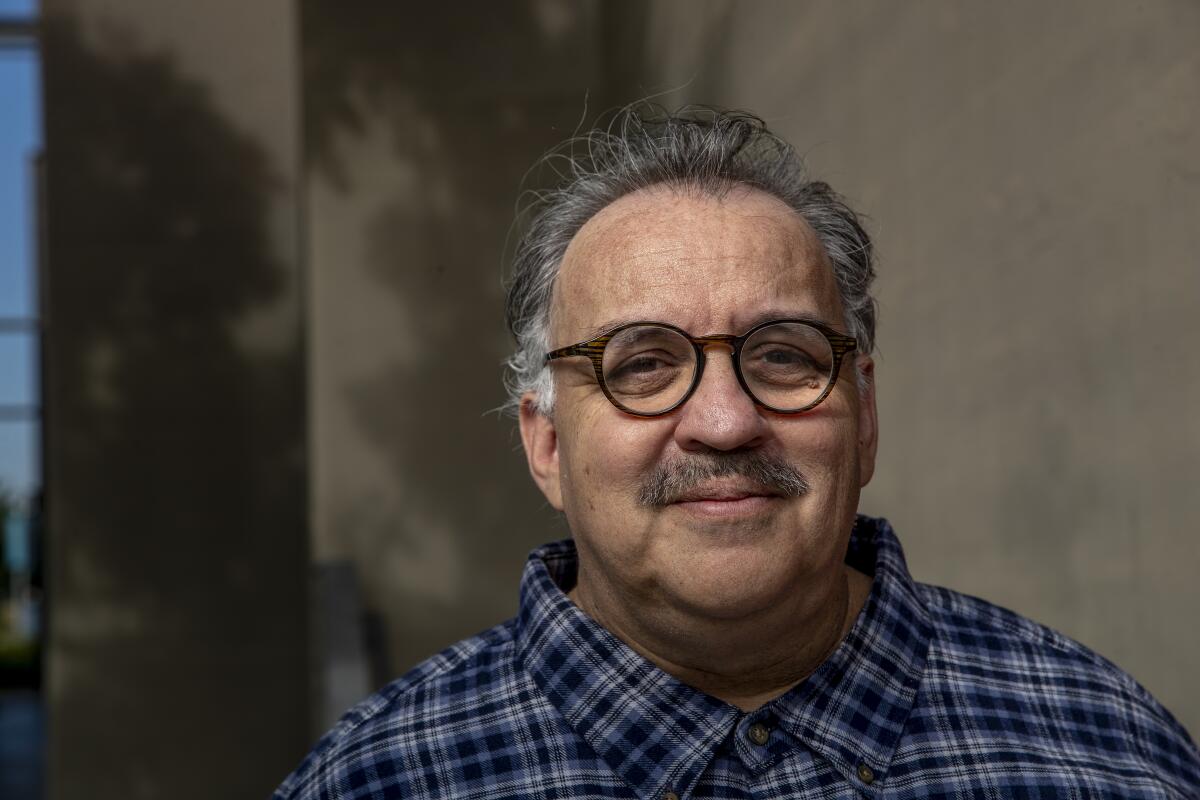
“There’s something very nice about watching actors six feet apart doing their thing,” Alfaro said. “They were able to emotionally connect in a theatrical space.”
Alfaro noted that viewers will see mic cables and power cords on the floor because they serve as ephemeral set pieces, reminding viewers of the strange moment we are living through, and that what they are seeing is a single uninterrupted performance, or in some cases two, captured live. The same can be said of the backdrop for the readings: the sea of empty red seats that in normal times would be packed with program-rustling, throat-clearing, chronically shushing humanity.
The theater’s COVID safety plan is enshrined in an expanding 80-page document titled “Finding Our Center.” It was influenced and inspired by SAG-AFTRA’s “Safe Way Forward” compendium of coronavirus precautions and guidelines for film and TV sets in a pre-vaccine world.
Oken said that one of his team’s biggest challenges was accumulating all the necessary PPE, including face masks, hand sanitizer and dispensers, and CDC-approved cleaning products.
Does he know where to get Clorox wipes?
“Like everyone in the business, I’ve got a guy,” he joked.
He has strong connections with trusted vendors, and the trick to securing the necessary items is locking down supply chains during the right windows of time.
Oken’s team also saw to it that the Kirk Douglas’ HVAC filtration system was upgraded and that the space received proper ventilation through open doors. Additional precautions include keeping staff members in discrete pods should a need arise for contact tracing, extensive end-of-the-day cleaning by specialized teams in polypropylene suits, and splitting the workspace into zones.
Zone A is the stage itself, where the actors take off their masks; Zone B is the production zone; and Zone C is outside the theater, where Alfaro said he often found himself waiting with others to get coronavirus test results and clearance to enter the theater.
“Every zone has PPE in its designated area,” Oken said, adding that the film crews wear some sort of face covering and respirator when the actors are barefaced. “You can’t really go 10 feet in the theater without hand sanitizer or PPE.”
Production manager Christopher Reardon said the precautions can be taxing, but that they are well worth the happiness of returning to the theater.
“As great as it was to return to the theater, it was scary, too,” Reardon said. “Everybody is overjoyed, but in this weird mental place of always being on edge. So it was nice to see that we’re doing this right, and doing it safe.”
Part of being safe is limiting the number of people involved in any given production. Along with the four cameras used for shooting the Alfaro trilogy, one camera was feeding a dedicated YouTube livestream so that all the people who would normally be in the building during the show, including producers, could watch the action.
Another technical COVID innovation is a device called the ZoomBox, featuring a flat screen on a rolling stand plugged into a laptop. This device allowed actors in “Oedipus El Rey” to interact with their director, Chay Yew, who was not in Los Angeles.
When the Alfaro trilogy begins streaming, the playwright said, each installment will perhaps be more thematically relevant than it was when it was first staged, beginning with “Electricidad” in 2003 and ending with “Mojada” in 2015.
“Oedipus El Rey” is an examination of the California prison system, with its high rates of recidivism; “Mojada” limns the difficulties faced by undocumented immigrants; and “Electricidad” is about girl gangs and revenge in an L.A. barrio.
“The Greeks gave us this timeless opportunity to ask questions about society, and I think I’ve honored the Greeks in that way,” Alfaro said. “These plays continue to raise a lot of questions about who we are as a people and a community.”
Both Alfaro and director Carrillo point out that “Mojada,” with its emphasis on people now commonly referred to as “essential workers,” is ripe for interpretation in the COVID era.
“Each character has had to sacrifice something in order to survive in the U.S.,” Carrillo said. “That part of the story is heightened in this context because this population is having to take bigger risks than everybody else.”
The element of sacrifice should have deep resonance for contemporary audiences, Alfaro said.
The playwright lives in Koreatown, a neighborhood rich with immigrant communities. Each morning he rises before first light to take a walk, and he is moved to see so many of his neighbors already out in the streets, on their way to jobs they can’t perform remotely.
It is a population, he said, at the mercy of the city itself.
There is tragedy in that. And also enormous triumph.
Grapes mean a lot in Luis Alfaro’s family.
More to Read
The biggest entertainment stories
Get our big stories about Hollywood, film, television, music, arts, culture and more right in your inbox as soon as they publish.
You may occasionally receive promotional content from the Los Angeles Times.
